外研版(2019) 必修第一册 Unit 1 A New Start Using language 课件(33张ppt)
文档属性
| 名称 | 外研版(2019) 必修第一册 Unit 1 A New Start Using language 课件(33张ppt) |  | |
| 格式 | pptx | ||
| 文件大小 | 8.0MB | ||
| 资源类型 | 教案 | ||
| 版本资源 | 外研版(2019) | ||
| 科目 | 英语 | ||
| 更新时间 | 2022-10-14 11:24:02 | ||
图片预览

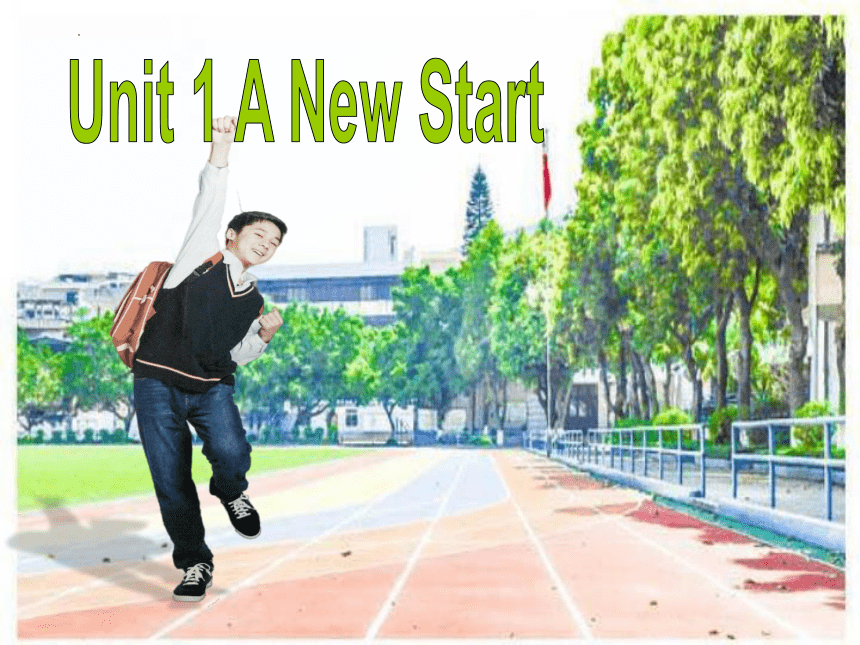
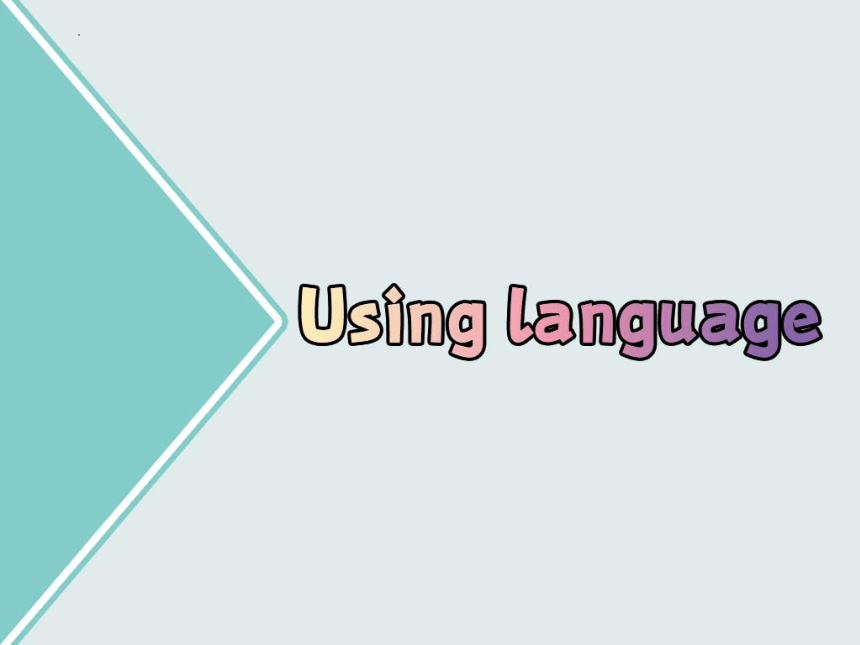
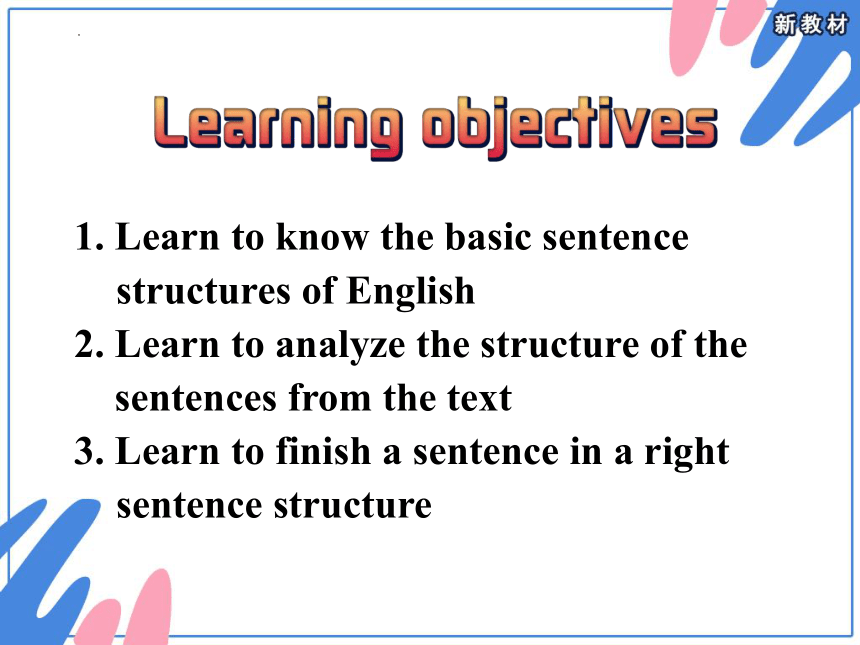
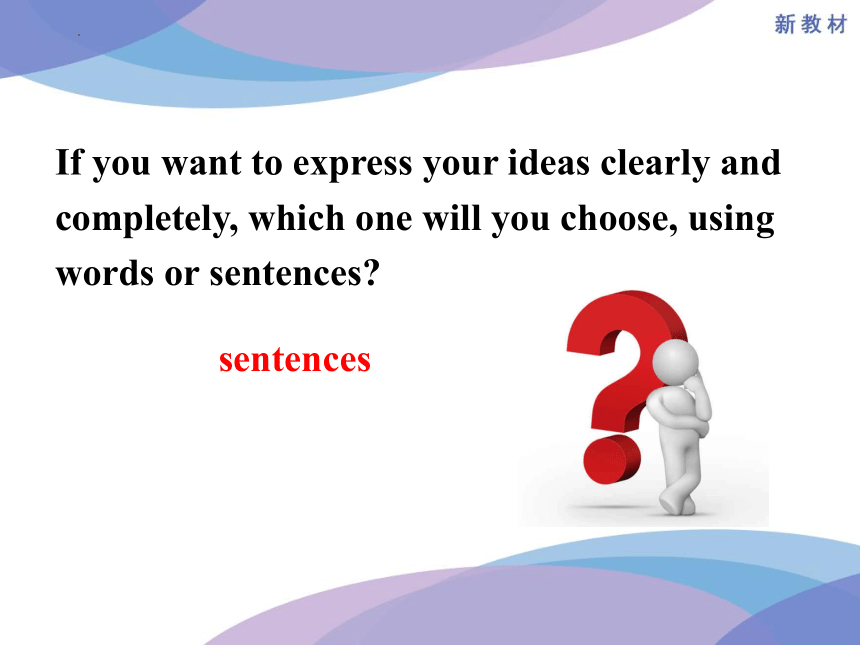
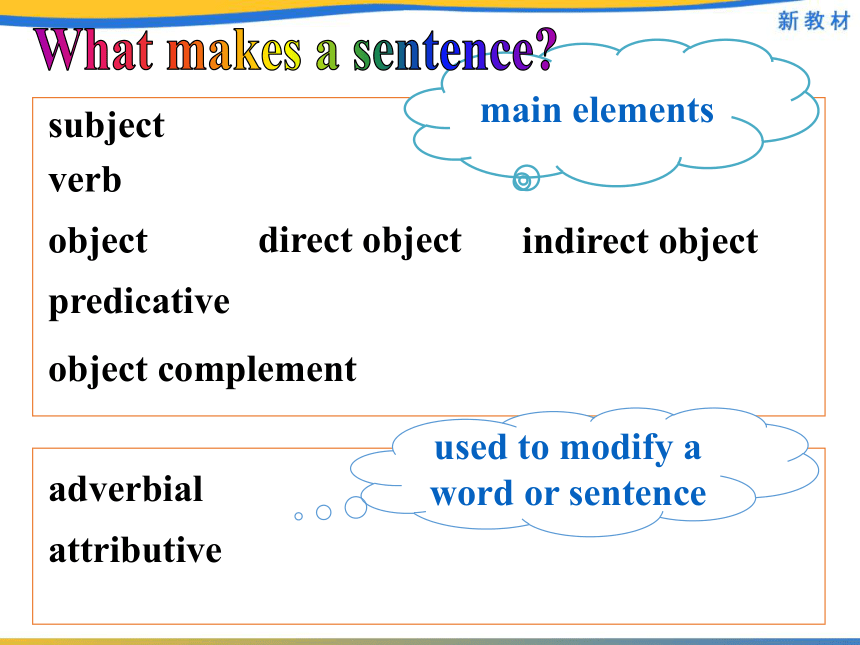
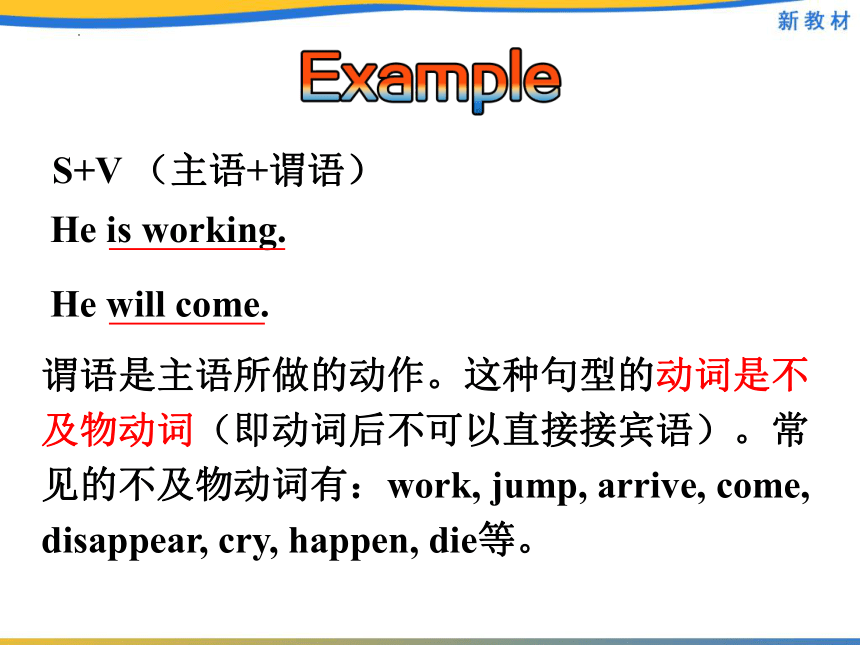
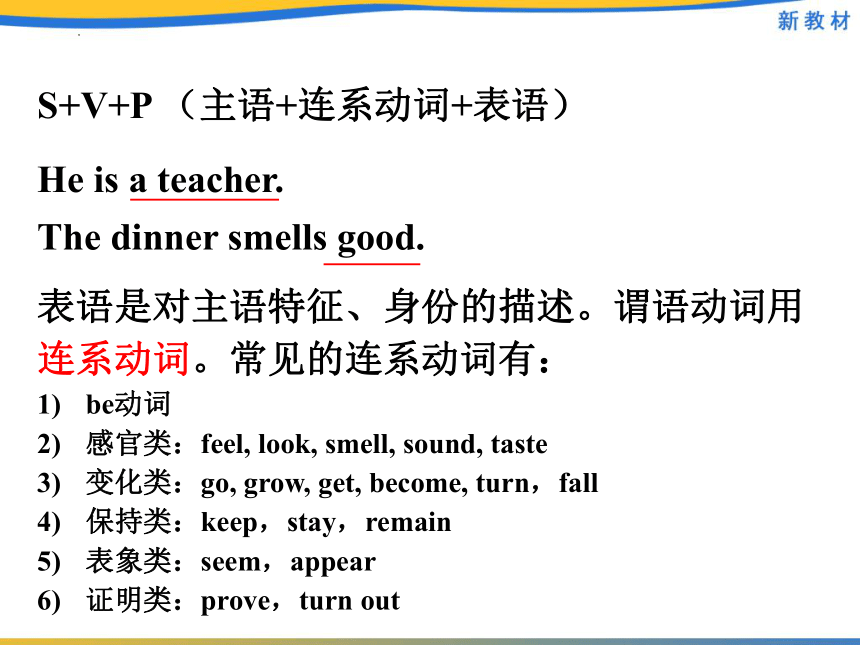
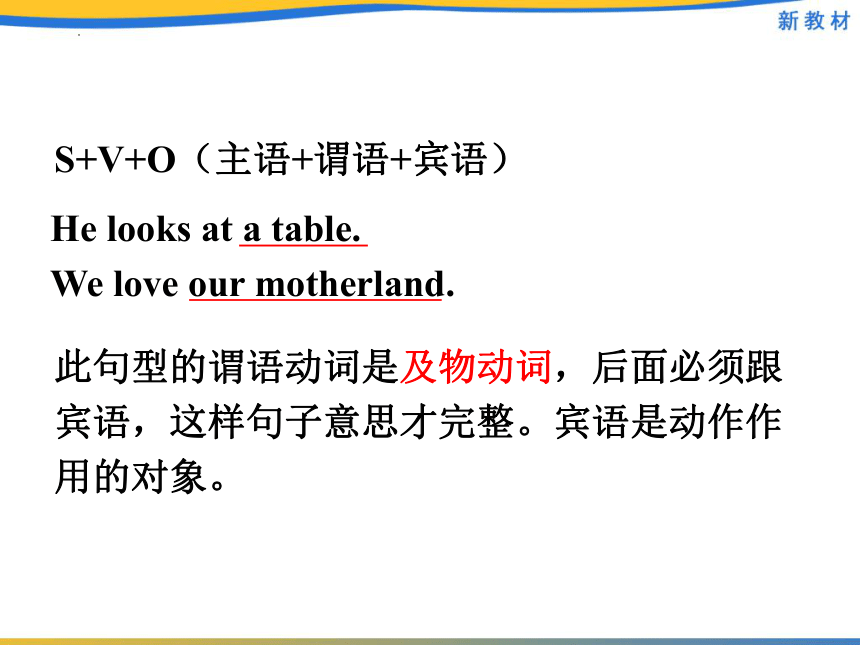
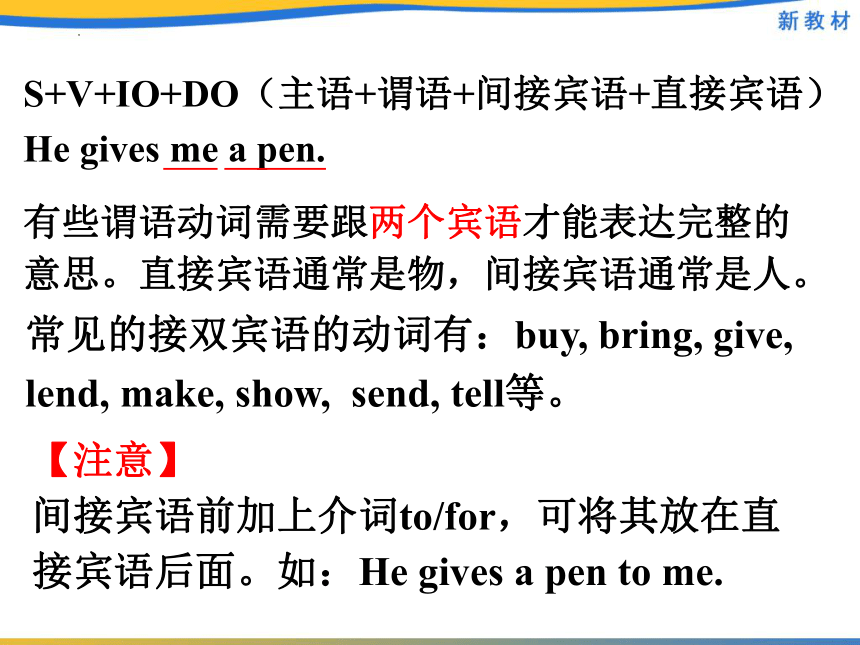
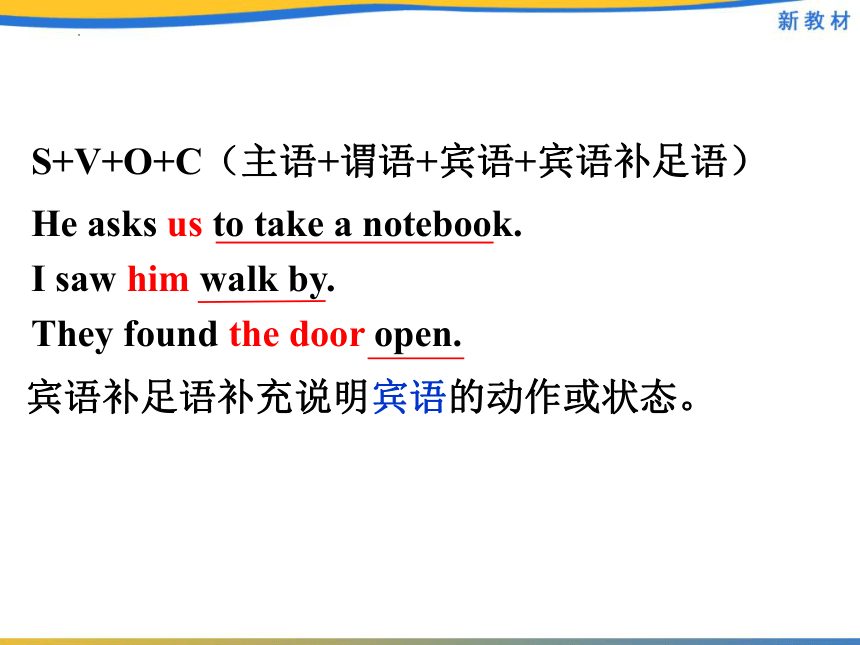
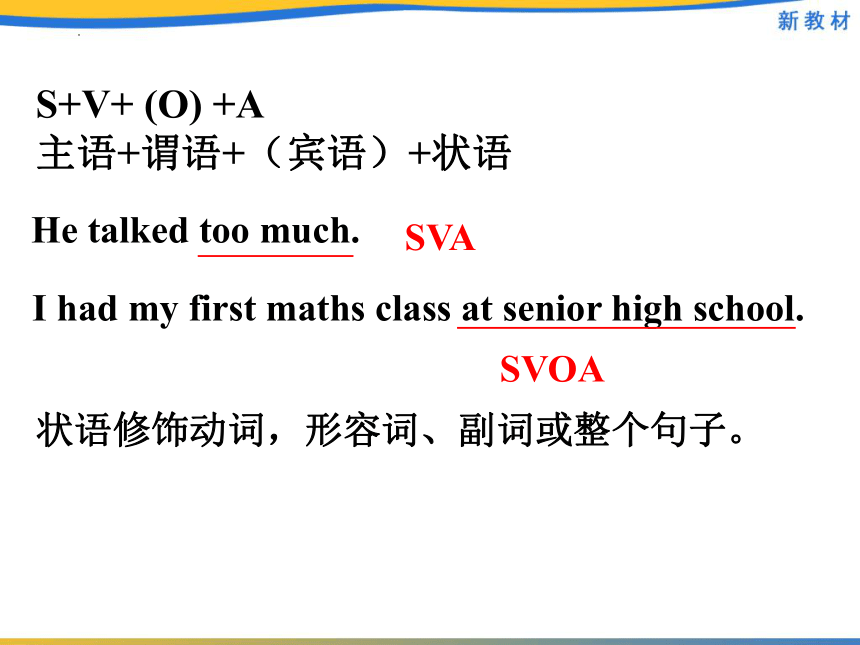
文档简介
Unit 1
Unit 1 A New Start
1. Learn to know the basic sentence structures of English
2. Learn to analyze the structure of the
sentences from the text
3. Learn to finish a sentence in a right sentence structure
If you want to express your ideas clearly and completely, which one will you choose, using words or sentences?
sentences
subject
verb
object
predicative
direct object
indirect object
object complement
main elements
adverbial
attributive
used to modify a word or sentence
What makes a sentence?
S+V (主语+谓语)
He is working.
He will come.
谓语是主语所做的动作。这种句型的动词是不及物动词(即动词后不可以直接接宾语)。常见的不及物动词有:work, jump, arrive, come, disappear, cry, happen, die等。
S+V+P (主语+连系动词+表语)
He is a teacher.
The dinner smells good.
表语是对主语特征、身份的描述。谓语动词用连系动词。常见的连系动词有:
be动词
感官类:feel, look, smell, sound, taste
变化类:go, grow, get, become, turn,fall
保持类:keep,stay,remain
表象类:seem,appear
证明类:prove,turn out
S+V+O(主语+谓语+宾语)
He looks at a table.
We love our motherland.
此句型的谓语动词是及物动词,后面必须跟宾语,这样句子意思才完整。宾语是动作作用的对象。
S+V+IO+DO(主语+谓语+间接宾语+直接宾语)
He gives me a pen.
有些谓语动词需要跟两个宾语才能表达完整的意思。直接宾语通常是物,间接宾语通常是人。
常见的接双宾语的动词有:buy, bring, give, lend, make, show, send, tell等。
【注意】
间接宾语前加上介词to/for,可将其放在直接宾语后面。如:He gives a pen to me.
S+V+O+C(主语+谓语+宾语+宾语补足语)
He asks us to take a notebook.
I saw him walk by.
They found the door open.
宾语补足语补充说明宾语的动作或状态。
He talked too much.
状语修饰动词,形容词、副词或整个句子。
SVA
I had my first maths class at senior high school.
SVOA
S+V+ (O) +A
主语+谓语+(宾语)+状语
Analyze the following sentences.
1. They work hard.
主语
谓语
表语
2. The flower is dead.
主语
系动词
状语
3. Plants need water.
主语
谓语
间宾
4. He gives me some seeds.
主语
谓语
宾语
直宾
5. We should keep the plants in the shade.
主语
谓语
宾语
6. We found her in tears.
主语
谓语
宾语
宾补
状语
写出下面句子的结构类型。
1. Everybody smiled. ______________
2. The car caught fire. ______________
3. Did the milk turn sour? ______________
4. He bought his wife a dress. ______________
5. Roy found his new job rather boring.
______________
6. Your brother got up at 10 o’clock.
______________
7. I haven’t seen Daniel for long.
______________
SV
SVO
SP
SVOO
SVOC
SVA
SVOA
Match the sentences that share the same structures.
1. I saw a white-haired man.
2. I replied.
3. He gave me a smile.
4. I breathed deeply.
5. I looked at them in panic.
6. I was embarrassed.
7. His words made me a lot more relaxed!
a. He was friendly.
b. The exam made me quite nervous.
c. I passed him a book.
d. She agreed.
e. He wrote a long letter.
f. He talked loudly.
g. She looked after her sister patiently.
1-e 2-d 3-c 4-f 5-g 6-a 7-b
Write the basic sentence structures.
1. I saw a white-haired man.
2. I replied.
3. He gave me a smile.
4. I breathed deeply.
5. I looked at them in panic.
6. I was embarrassed.
7. His words made me a lot more relaxed.
主谓状 SVA
主谓 SV
主谓宾宾 SVOO
主(系)表 SP
主谓宾状 SVOA
主谓宾 SVO
主谓宾补 SVOC
Look at the pictures and tell the story with your own ending. See how many different basic sentence structures you use.
基本句型:
一、主谓 SV
二、主(系)表 SP
三、主谓宾 SVO
四、主谓宾宾 SVOO
五、主谓宾补 SVOC
六、主谓状 SVA
七、主谓宾状 SVOA
Ⅰ. Read the sentences and analyze the
structures.
1. I’m not out-going.
2. The teacher was kind and friendly.
3. He told a funny story.
4. Everyone laughed.
5. I found most of my classmates and teachers friendly and helpful.
6. I didn’t feel awkward or frightened.
7. He told us funny stories.
SVOO
SP
SVOC
SV
SVO
SP
SP
8. I couldn’t concentrate on the experiment.
9. I felt much more confident.
10. I want to make a good first impression.
11. Tomorrow will be great.
12. We had our chemistry class in the science lab.
SVO
SP
SVO
SP
SVOA
School clubs
Complete the posters with the correct form of the words in the box.
badminton drama band debate gym piano stage photography science
Badminton
gym
Drama
stage
piano
band
School clubs
Complete the posters with the correct form of the words in the box.
badminton drama band debate gym piano stage photography science
Debate
Science
Photography
Work in pairs. Talk about the school clubs you would like to join and the activities you can do in them.
I’d like to join …club. Because I like / want to …
Besides, the club has various after-school activities, such as…
These activities not only…, but also …
Useful expressions:
多种多样的课外活动
After-school activities usually take up a lot of time. How can you make a balance between study and after-school activities?
占用(时间)
平衡……与……
Making a plan
In the UK and the US, senior high school students take part in various after-school activities, such as club activities and volunteer work. These activities not only help them gain more skills, but also teach them to care about others. After- school activities also play a part when students apply to college. However, they can take up a lot of time, so students have to learn to organise their busy schedules. To help them do this, some senior high schools offer courses in time management.
一个句子作基本介绍,引入话题。“…, such as…” 结构举例。
两个句子指出3个优点。用“…not only…, but also …; … also …”结构串联。变换主语表达,避免重复。
指出不足及解决方案。“However”表明转折。
学校帮助。
Making a plan
In the UK and the US, senior high school students take part in various after-school activities, such as club activities and volunteer work. These activities not only help them gain more skills, but also teach them to care about others. After- school activities also play a part when students apply to college. However, they can take up a lot of time, so students have to learn to organise their busy schedules. To help them do this, some senior high schools offer courses in time management.
help sb. (to) do sth.
申请;to是介词
提供…课程
时间管理
起作用
安排繁忙的计划表
Making a plan
Listen to the conversation and decide what the speakers are mainly talking about.
1 The clubs they have joined and the activities they do after school.
2 The things they should do to manage their time well.
3 The challenges they face in their new school.
Listen again and complete the plan.
1. __________ the things we’re going to do.
2. Record ______________ to do the activities.
3. Only _____________ at a time.
4. Do ________________ first.
List
the time (it takes)
do one thing
important things
Work in pairs. Act out the conversation to discuss ideas for a weekend study plan for English.
Student A: Turn to Page 81.
Student B: Turn to Page 84.
Work in pairs. Make another weekend plan and have a similar conversation.
Unit 1 A New Start
1. Learn to know the basic sentence structures of English
2. Learn to analyze the structure of the
sentences from the text
3. Learn to finish a sentence in a right sentence structure
If you want to express your ideas clearly and completely, which one will you choose, using words or sentences?
sentences
subject
verb
object
predicative
direct object
indirect object
object complement
main elements
adverbial
attributive
used to modify a word or sentence
What makes a sentence?
S+V (主语+谓语)
He is working.
He will come.
谓语是主语所做的动作。这种句型的动词是不及物动词(即动词后不可以直接接宾语)。常见的不及物动词有:work, jump, arrive, come, disappear, cry, happen, die等。
S+V+P (主语+连系动词+表语)
He is a teacher.
The dinner smells good.
表语是对主语特征、身份的描述。谓语动词用连系动词。常见的连系动词有:
be动词
感官类:feel, look, smell, sound, taste
变化类:go, grow, get, become, turn,fall
保持类:keep,stay,remain
表象类:seem,appear
证明类:prove,turn out
S+V+O(主语+谓语+宾语)
He looks at a table.
We love our motherland.
此句型的谓语动词是及物动词,后面必须跟宾语,这样句子意思才完整。宾语是动作作用的对象。
S+V+IO+DO(主语+谓语+间接宾语+直接宾语)
He gives me a pen.
有些谓语动词需要跟两个宾语才能表达完整的意思。直接宾语通常是物,间接宾语通常是人。
常见的接双宾语的动词有:buy, bring, give, lend, make, show, send, tell等。
【注意】
间接宾语前加上介词to/for,可将其放在直接宾语后面。如:He gives a pen to me.
S+V+O+C(主语+谓语+宾语+宾语补足语)
He asks us to take a notebook.
I saw him walk by.
They found the door open.
宾语补足语补充说明宾语的动作或状态。
He talked too much.
状语修饰动词,形容词、副词或整个句子。
SVA
I had my first maths class at senior high school.
SVOA
S+V+ (O) +A
主语+谓语+(宾语)+状语
Analyze the following sentences.
1. They work hard.
主语
谓语
表语
2. The flower is dead.
主语
系动词
状语
3. Plants need water.
主语
谓语
间宾
4. He gives me some seeds.
主语
谓语
宾语
直宾
5. We should keep the plants in the shade.
主语
谓语
宾语
6. We found her in tears.
主语
谓语
宾语
宾补
状语
写出下面句子的结构类型。
1. Everybody smiled. ______________
2. The car caught fire. ______________
3. Did the milk turn sour? ______________
4. He bought his wife a dress. ______________
5. Roy found his new job rather boring.
______________
6. Your brother got up at 10 o’clock.
______________
7. I haven’t seen Daniel for long.
______________
SV
SVO
SP
SVOO
SVOC
SVA
SVOA
Match the sentences that share the same structures.
1. I saw a white-haired man.
2. I replied.
3. He gave me a smile.
4. I breathed deeply.
5. I looked at them in panic.
6. I was embarrassed.
7. His words made me a lot more relaxed!
a. He was friendly.
b. The exam made me quite nervous.
c. I passed him a book.
d. She agreed.
e. He wrote a long letter.
f. He talked loudly.
g. She looked after her sister patiently.
1-e 2-d 3-c 4-f 5-g 6-a 7-b
Write the basic sentence structures.
1. I saw a white-haired man.
2. I replied.
3. He gave me a smile.
4. I breathed deeply.
5. I looked at them in panic.
6. I was embarrassed.
7. His words made me a lot more relaxed.
主谓状 SVA
主谓 SV
主谓宾宾 SVOO
主(系)表 SP
主谓宾状 SVOA
主谓宾 SVO
主谓宾补 SVOC
Look at the pictures and tell the story with your own ending. See how many different basic sentence structures you use.
基本句型:
一、主谓 SV
二、主(系)表 SP
三、主谓宾 SVO
四、主谓宾宾 SVOO
五、主谓宾补 SVOC
六、主谓状 SVA
七、主谓宾状 SVOA
Ⅰ. Read the sentences and analyze the
structures.
1. I’m not out-going.
2. The teacher was kind and friendly.
3. He told a funny story.
4. Everyone laughed.
5. I found most of my classmates and teachers friendly and helpful.
6. I didn’t feel awkward or frightened.
7. He told us funny stories.
SVOO
SP
SVOC
SV
SVO
SP
SP
8. I couldn’t concentrate on the experiment.
9. I felt much more confident.
10. I want to make a good first impression.
11. Tomorrow will be great.
12. We had our chemistry class in the science lab.
SVO
SP
SVO
SP
SVOA
School clubs
Complete the posters with the correct form of the words in the box.
badminton drama band debate gym piano stage photography science
Badminton
gym
Drama
stage
piano
band
School clubs
Complete the posters with the correct form of the words in the box.
badminton drama band debate gym piano stage photography science
Debate
Science
Photography
Work in pairs. Talk about the school clubs you would like to join and the activities you can do in them.
I’d like to join …club. Because I like / want to …
Besides, the club has various after-school activities, such as…
These activities not only…, but also …
Useful expressions:
多种多样的课外活动
After-school activities usually take up a lot of time. How can you make a balance between study and after-school activities?
占用(时间)
平衡……与……
Making a plan
In the UK and the US, senior high school students take part in various after-school activities, such as club activities and volunteer work. These activities not only help them gain more skills, but also teach them to care about others. After- school activities also play a part when students apply to college. However, they can take up a lot of time, so students have to learn to organise their busy schedules. To help them do this, some senior high schools offer courses in time management.
一个句子作基本介绍,引入话题。“…, such as…” 结构举例。
两个句子指出3个优点。用“…not only…, but also …; … also …”结构串联。变换主语表达,避免重复。
指出不足及解决方案。“However”表明转折。
学校帮助。
Making a plan
In the UK and the US, senior high school students take part in various after-school activities, such as club activities and volunteer work. These activities not only help them gain more skills, but also teach them to care about others. After- school activities also play a part when students apply to college. However, they can take up a lot of time, so students have to learn to organise their busy schedules. To help them do this, some senior high schools offer courses in time management.
help sb. (to) do sth.
申请;to是介词
提供…课程
时间管理
起作用
安排繁忙的计划表
Making a plan
Listen to the conversation and decide what the speakers are mainly talking about.
1 The clubs they have joined and the activities they do after school.
2 The things they should do to manage their time well.
3 The challenges they face in their new school.
Listen again and complete the plan.
1. __________ the things we’re going to do.
2. Record ______________ to do the activities.
3. Only _____________ at a time.
4. Do ________________ first.
List
the time (it takes)
do one thing
important things
Work in pairs. Act out the conversation to discuss ideas for a weekend study plan for English.
Student A: Turn to Page 81.
Student B: Turn to Page 84.
Work in pairs. Make another weekend plan and have a similar conversation.
